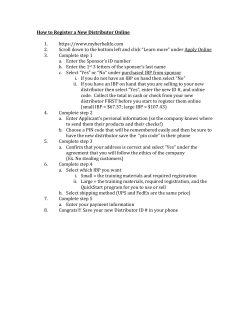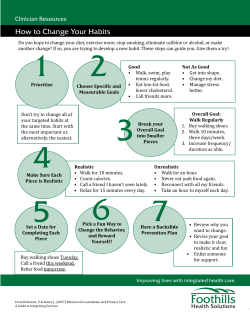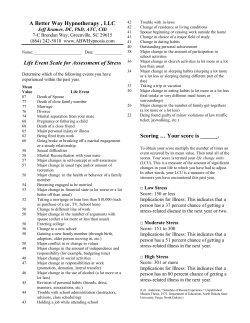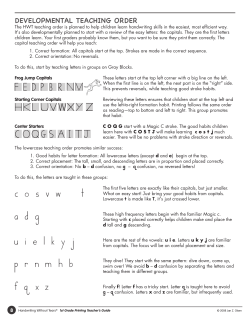
Document 244510
How The Brain Forms New Habits: Why Willpower Is Not Enough Profession(s) __________________________________________________________ Four Ways To Register 1. Internet: www.IBPCEU.com 2. Mail: PO Box 17, Haddonfield, NJ 08033 (make check payable to IBP) 3. Fax: 877-517-5222 4. Phone: 866-652-7414 Purchase orders are accepted. IBP tax identification number 77-0026830 All major credit cards accepted: Seminar q $79 preregistered q $74 group rate (3 or more persons preregistering at the same time) $89 on-site registration (if space is available) Type of card _______________ Card # ____________________________________ Exp. Date_______/__________ Signature_____________________________________________________________ Haddonfield, NJ 08033 Email ________________________________________________________________ PO Box 17 (please print email if available) Institute for Brain Potential Fax (____) _________________________ TAMPA: Friday, October 5 Work phone (____) _________________ Home phone (____) _________________ CLEARWATER: Thursday, October 4 City/State__________________________________, ____ Zip __________________ BRADENTON: Wednesday, October 3 Home Address ________________________________________________________ Why Willpower Is Not Enough Name (please print) ___________________________________________________ FORT MYERS: Tuesday, October 2 q Bradenton, Oct. 3 q Tampa, Oct. 5 How The Brain Forms New Habits: q Fort Myers, Oct. 2 q Clearwater, Oct. 4 one: A 6-Hour Seminar for Health Professionals, Fall, 2012 $79 Please do not contact venues except for driving instructions. Complimentary parking available at all sites. PLEASE POST FORT MYERS, FL Tuesday, October 2 CROWNE PLAZA AT BELLE TOWER, 13051 Bell Tower Drive, 33907 From US-41 N, turn right onto Big Pine Way. Turn right onto Bell Tower Dr. Make a U-turn and the hotel is on the right. From US-41 S, take Exit 131. Turn right onto Big Pine Way. Turn right onto Bell Tower Dr. Make a U-turn and the hotel is on the right. (239) 482-2900 BRADENTON, FL Wednesday, October 3 RENAISSANCE ON 9TH, 1816 9th Street West, 34205 From US-301 S, turn right onto 9th St E. Turn right onto 26th Ave E. Turn right onto 9th St W. The venue is on the left. From US-301 N, make a U-turn at 9th Ave. Turn right onto S. Tamiami Trail/1st St. Turn right onto 17th Ave W. Turn left onto 9th St W. The venue is on the right. (941) 749-0100 CLEARWATER, FL Thursday, October 4 HOLIDAY INN, 521 South Gulfview Boulevard, 33767 From I-275 South take FL-60/SR 589 towards Clearwater. Take the exit for South Gulfview Blvd. The hotel is on the right. From I-275 North, go over the Sunshine Skyway to Exit 30 (Roosevelt Blvd.) Turn right onto Gulf Blvd. Continue onto Gulfview Blvd. The hotel is on the left. (727) 447-6461 TAMPA, FL Friday, October 5 RAMADA, 1200 North Westshore Boulevard, 33607 From I-275 S, take Exit 40A (Westshore Blvd.) and bear right. The hotel is 2 blocks on the left. From I-275 N, take Exit 39A (Kennedy Blvd.) Turn left onto Westshore Blvd. The hotel is 4 blocks on the left. (813) 282-3636 How The Brain Forms New Habits: Why Willpower Is Not Enough A Seminar for Health Professionals Schedule: Check in: 8:15-9 AM, program starts: 9 AM, lunch (on own): 11:30 AM, Q&A and discussion with instructor: 12-12:30 PM, lecture resumes: 12:30 PM, adjournment: 4 PM. Please register early and arrive before the start time. Space is limited. Group Registrations: Rates apply for 3 or more pre-registered guests enrolling together. Please complete a separate registration form for each person. Members of a group can attend on different dates. Confirmation Notices and Certificates of Completion: We will confirm your registration by email or by letter. Please attend even if you do not receive a confirmation. Registrants are responsible for parking fees, if any. Successful completion includes full attendance and submission of the evaluation form. No partial credit will be given. Certificates of completion are provided at the time of adjournment. Transfers and Cancellations: Registrants can transfer to another seminar if space is available. Registrants canceling up to 48 hours before a seminar will receive a tuition refund less a $15 administrative fee, or if requested, a full-value voucher good for one year, for a future seminar. In the unlikely event that the seminar cannot be held (e.g., an act of God), registrants will receive free admission to a rescheduled seminar or a full-value voucher, good for one year, for a future seminar. All requests must be made in writing or online. No IBP program has ever been cancelled as the result of low attendance. We anticipate that participants will have desks at most locations. Customer Service: Call 888-202-2938 or 877-418-5474 to ask about course content, instructors, request accommodations for disability, submit a formal grievance, or remove your name from a list. For other questions, call 866-652-7414. Institute for Brain Potential: We are a leading provider of programs on the brain and behavioral sciences. Our non-profit organization (tax i.d. 77-0026830) has provided cost-effective, informative and practical seminars by outstanding speakers since 1984. How The Brain Forms New Habits: Why Willpower Is Not Enough NURSES: Institute for Brain Potential (IBP) is accredited as a provider of continuing nursing education by the American Nurses Credentialing Center’s Commission on Accreditation. IBP is an approved provider of the Florida Board of Nursing. This program provides 6 contact hours for Florida RNs and LPNs. PSYCHOLOGISTS: This course is approved by the Florida Board of Psychology to provide 6 hours of continuing education. IBP is approved by the American Psychological Association to sponsor continuing education for psychologists. IBP maintains responsibility for this program. SOCIAL WORKERS, MFTs & COUNSELORS: IBP has been approved to provide 6 hours of continuing education by the Florida Board of Clinical Social Work, Marriage and Family Therapy and Mental Health Counseling. PHARMACISTS: IBP is accredited by the Accreditation Council for Pharmacy Education as a provider of continuing pharmacy education. This application-based activity is designated for 6 hours (.6 CEU). Initial release date: 12/14/10. UAN: 0492-0000-10-019-L04-P DENTAL PROFESSIONALS: IBP is an approved provider of the Florida Board of Dentistry. IBP is designated as an Approved PACE Program Provider by the Academy of General Dentistry (AGD). The formal continuing dental education programs of this provider are accepted by the AGD for Fellowship/Mastership and membership maintenance credit. Approval does not imply acceptance by a state or provincial board of dentistry or AGD endorsement. The current term of approval extends from 12/01/10 – 11/30/14. OCCUPATIONAL THERAPISTS: This course is approved by the Florida Board of Occupational Therapy Practice for 6 hours of continuing education. IBP is an approved provider of the American Occupational Therapy Association (AOTA), provider #6050. MASSAGE THERAPISTS: This course is approved by the Florida Board of Massage Therapy for 6 hours of continuing education. NURSING HOME ADMINISTRATORS: IBP is an approved provider by the Florida Board of Nursing Home Administration. The program provides 6 hours of credit. CASE MANAGERS: This program has been pre-approved by the Commission for Case Manager Certification to provide continuing education credit to Certified Case Managers (CCMs). SPEECH-LANGUAGE PATHOLOGISTS & AUDIOLOGISTS: This program has been approved for .6 CEU’s or 6 hours of continuing professional development by the Florida Board of Speech-Language Pathology and Audiology. DIETITIANS & NUTRITIONISTS: IBP is a CPE Accredited Provider with the Commission on Dietetic Registration (CDR). RDs and DTRs will receive 6 CPEUs for completion of this program. Florida Dietetics and Nutrition Practice Council accepts CDR-accredited programs. EDUCATORS: This program provides 7.5 Inservice Points of professional development in FL toward license renewal. IBP is cosponsored by Adams State Univ., a member of the Teachers Education Accreditation Council. Please contact your school district if you need prior approval for this program. PENDING APPROVAL: With the Florida Board of Acupuncture, the Florida Board of Optometry, and the Florida Physical Therapy Association (FPTA) for 6 hours of continuing education credit. Please contact IBP customer service at 650-960-3536 or visit www.cebroker.com, provider #50-9415. Why are habits so difficult to change? Habits govern how we think and act. They influence who needs care and who stays well in medical, dental, psychological, and educational settings. This 6-hour seminar describes how the brain forms new habits and how to facilitate meaningful change. Participants completing the program should be able to: 1) Name several characteristics of reward-centered habits. 2) Identify several evidence-based strategies for managing rewardcentered habits. 3) Describe how threat-based mental habits are connected to maladaptive emotions and actions. 4) List one or more strategies for coping adaptively with threat-based mental habits. 5) Identify several evidence-based principles for initiating and maintaining health-promoting habits. Reward-Centered Habits • Understanding Reward-Centered Habits: overeating, drinking, smoking and other risky behaviors; how do they become addictive? • Neurotransmitters: pursuit of immediate gratification, “wanting” and dopamine; “liking” and opiate peptides; withdrawal and serotonin deficiency. • Features of Addiction: compulsive reward-seeking, dependence, withdrawal and reinstatement of craving. • Addictive Features of Comfort Foods: dopamine and craving for fatty foods; serotonin and craving for carbohydrates; opiates and sweets; how feeling bad about weight can stimulate eating. • Storehouse of Addictive Habits: how the basal ganglia recall skilled movements associated with reward-based obsessions and compulsions. • Changing Reward-Based Habits: how the frontal lobes can inhibit old habits and initiate new ones by reprogramming the basal ganglia. Using Your Brain To Form New Habits • Dorsolateral Prefrontal Cortex: developing flexible plans of action to set goals and handle lapses; cues to remind of adaptive habits. • Ventral Striatum: preventing dopamine deprivation that results in overvaluing unhealthy rewards; reward substitution strategies through healthy pleasures and social support. • Anterior Cingulate Cortex: maintaining motivation by learning how to regulate mood and positive expectations; reassessing values and goals to unlearn bad habits linked to situational triggers. • Temporal Lobe Neocortex: applying cognitive behavioral therapies to reinterpret events in a way that leads to meaningful change. Threat-Based Mental Habits • Stress-Based Habits: how stress can increase impulsivity and negative emotions; how a sense of control can decrease them. • Generalized Anxiety: exaggerated fear of physical or psychological danger; fear conditioning and the amygdala. • Recurrent Anger: persistent resentment over injustices across time, place and person; the role of prefrontal cognitive distortion. • Depression: persistent negative thoughts of self in relation to the past, present and future, e.g., rumination and the central role of the anterior cingulate gyrus. • OCD: repeated alerting or doubting about safety; repetitive acts to ward off danger and the role of the basal ganglia. • Chronic Pain: fear of injury and compulsive avoidance of movement, amplification of negative emotion, and the fight-or-flight response. Overcoming Threat-Based Mental Habits • Cataloguing Automatic Thoughts: a systematic approach to identifying thoughts and situational triggers, counter-conditioning to institute competing positive thoughts. • Graded Exposure To One’s Fears: how this approach can reduce threat-based signals originating from the amygdala and cerebral cortex. • Cognitive-Behavioral Therapy (CBT): testing automatic thoughts for their accuracy, reframing maladaptive thoughts that trigger anxiety, anger, sadness, and shame; using temporal lobe neocortex to help revise prefrontal habit programming. • Positive Psychology: how identifying and deploying strengths can stimulate optimism, self-efficacy and, readiness to change, reduce impulsivity and activate motivational circuits of the cingulate gyrus and positive habits of gratitude, compassion and joy. • Mindfulness: how focused awareness inhibits automatic thoughts through subcortical circuits underlying attention; the power of stopping to smell the roses; pathways to mindfulness. Initiating And Maintaining Healthful Habits • Preschool: early habits that affect the lifelong risk of addiction and chronic disease, how to instill and reinforce positive habits. • Repetition of Skilled Movements: how long a habit must be practiced before becoming automatic, e.g., hand-washing, oral hygiene, safety precautions. • Temporal Habits: procrastination, scheduling physical activity, pilltaking, sleep hygiene, goal setting, self-monitoring. • Spatial Habits: using reminders to simplify, reduce clutter, and shape the environment to support goals. • Habit Substitution: guidelines for adopting a new habit to inhibit an old one. • Mastering The Five Brain Challenges: taming immediate gratification, valuing healthy pursuits, enhancing resilience to stress, retraining addiction circuits, and empowering the prefrontal cortex. About the Instructor Paul J. Kenny, Ph.D. (Scripps Research Institute, Jupiter, Florida), a neurobiologist, is internationally recognized for his contributions to the study of addictive habits including food addictions. He is the author of numerous scientific publications and his research has been funded by the National Institutes of Health and National Institute on Drug Abuse. Dr. Kenny’s research on food addictions has been featured on ABC, CBS, CNN and Good Morning America. An outstanding and personable speaker, health professionals highly recommend his seminars for his special ability to present practical discoveries with clarity, warmth and humor. In addition to Q & A sessions in class, Dr. Kenny will answer your questions during the second half of the lunch break and by email after the program concludes. © 2012 IBP
© Copyright 2025











